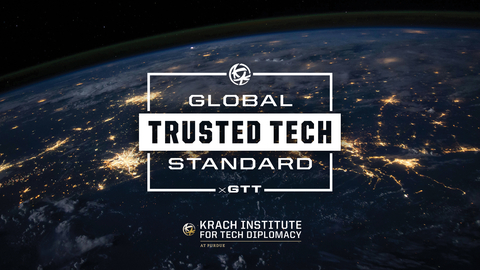The Krach Institute for Tech Diplomacy at Purdue, in partnership with global technology, national security, business and standard-setting experts, announced today a new initiative to establish the world’s first Global Trusted Tech (xGTT) Standard. The xGTT Standard will establish a clear framework to define and label trusted technology, enabling seamless, secure and efficient collaboration across companies, countries and organizations. Its primary goal is to accelerate the adoption of critical technologies that safeguard freedom, security and prosperity.
This press release features multimedia. View the full release here: https://www.businesswire.com/news/home/20241205414636/en/

(Graphic: Business Wire)
The initiative to develop the xGTT Standard is guided by a distinguished Board of Governors, chaired by Taiwan’s Cyber Ambassador-at-Large Audrey Tang and comprised of renowned industry leaders and international experts:
- Audrey Tang, Taiwan’s Cyber Ambassador-at-Large (Chair)
- Isabel Cane, Former Head of the OECD’s Trust in Business Initiative and the Blue Dot Network
- Alex Capri, Senior Fellow and Lecturer, National University of Singapore (NUS) Business School
- Rick Echevarria, Former Vice President, Intel
- Obiageli “Oby” Ezekwesili, Former Vice President (Africa Region), World Bank
- Fernando Garibay, Polymath, Producer, Academic, Founder & CEO, The Garibay Institute
- Melanie Garson, Cyber Resilience Strategy Lead, Tony Blair Institute for Global Change
- Dan Goldin, Former and Longest-Serving Administrator of NASA
- Takashi Oda, Director, Business Strategy, Corporate Strategy Planning, NTT
- Roman Pačka, Chief Advisor to the Director, National Cyber and Information Security Agency of the Czech Republic
- Heather Petersen, Former Head of Trust Strategy & Marketing, DocuSign
- Arvind Raman, Dean of Engineering, Purdue University
- David Roberts, CEO, Applied Research Institute
- Harsh Shringla, Former Foreign Secretary of India, Former Ambassador of India to the U.S.
- Tom Sonderman, CEO, SkyWater Technology Foundry
- Yigal Unna, Former Director General, Israel National Cyber Directorate
- Ken Urquhart, Global Vice President, 5G Strategy, Zscaler
The xGTT Standard will specify the criteria for countries, companies and organizations to be labeled as purveyors of trusted technology based on an evaluation across three key pillars: Technology Development, Technology Deployment and Technology Governance. The xGTT Standard initiative will also lead to the development of the Trusted Tech Certification Center to establish the trustworthiness of organizations involved in critical and emerging technologies. Organizations meeting key criteria, such as compliance with intellectual property laws, ethical sourcing, labor and environmental standards, data privacy protections, transparency and ethics will earn the “Trusted Tech” designation and benefit from faster, frictionless collaboration with other trusted partners.
“It is a profound privilege to collaborate with a remarkable group of visionaries on the Global Trusted Tech Standard. This initiative holds the potential to shape the foundation of our shared technological future,” said Audrey Tang, Taiwan’s Cyber Ambassador-at-Large and xGTT Standard Chair. “Through open and inclusive co-creation with all stakeholders, we strive to build digital resilience and free the future — together.”
The xGTT Standard initiative is a key output of the Global Tech Security Commission, chartered by the Krach Institute for Tech Diplomacy at Purdue with bipartisan support from the U.S. Congress and international partners. The Commission, which includes a global network of more than 200 public- and private-sector experts, examined the technological landscape and produced recommendations to accelerate the innovation, deployment and adoption of trustworthy critical and emerging technologies (CETs). Developing trusted technology standards was a key recommendation of the Commission, and the initiative to establish a Global Trusted Tech Standard serves to execute on that imperative. The xGTT Standard is designed to apply to the following CETs examined by the Global Tech Security Commission:
- 5G/6G
- Advanced Manufacturing and Robotics
- Artificial Intelligence and Machine Learning
- Autonomous and Electric Vehicles
- Biotechnologies
- Clean Energy and Electrical Grids
- Cloud Computing
- Financial Technologies
- Hypersonics
- Quantum and Advanced Computing
- Semiconductors and Microelectronics
- Space Technologies and Systems
“The key to securing freedom for the next generation is securing technology,” said Keith Krach, Co-chair of the Global Tech Security Commission alongside former President of Estonia Kersti Kaljulaid. “I am gratified that the Commission’s work is now being put into action with the establishment of the xGTT Standard. Making it easier for the Global Trusted Tech Network of innovators, investors and policymakers to engage in trusted collaboration will ensure tomorrow’s technology will serve humanity.”
“The Global Trusted Tech Standard is a revolutionary yet simple solution to enable trusted partners to collaborate faster and more effectively to advance freedom, security and prosperity,” said Michelle Giuda, CEO of the Krach Institute for Tech Diplomacy at Purdue. “One of our greatest strategic advantages in the free world is trust, rooted in our shared and unwavering commitment to human freedom and dignity. The xGTT Standard leverages this superpower to not only drive innovation but accelerate collaboration and outpace adversaries who weaponize untrusted technology. This initiative embodies the power of trust as a catalyst for ensuring technology advances freedom and strengthens global security.”
About the Krach Institute for Tech Diplomacy at Purdue:
The Krach Institute is the world’s preeminent trusted technology accelerator. As the leader in the new category of Tech Diplomacy, the Institute integrates technology expertise, Silicon Valley strategies and foreign policy tools to build the Global Trusted Tech Network of governments, companies, organizations and individuals to accelerate the innovation and adoption of trusted technology and ensure technology advances freedom.
Visit the Krach Institute online at TechDiplomacy.org and follow us on X, Facebook, LinkedIn and YouTube. Enroll in the Tech Diplomacy Academy to learn what you need to know now about key emerging technologies and their impact on business, policy and the global economy. Subscribe to the Institute’s weekly newsletter Tech Diplomacy Now for the latest news at the intersection of high tech and foreign policy.
View source version on businesswire.com: https://www.businesswire.com/news/home/20241205414636/en/